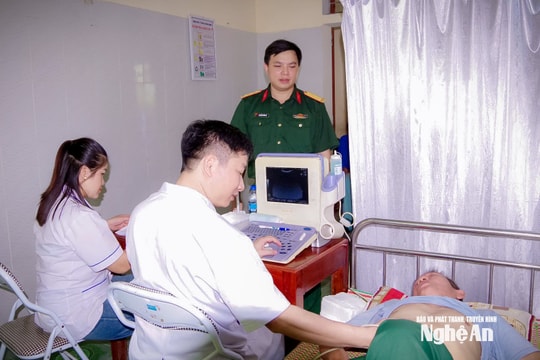Drug resistance: SOS
(Baonghean) - Nowadays, many people who only have a cold or cough, even if they do not need it, can still use antibiotics on their own. And the situation of drug sellers pretending to be doctors is still common in pharmacies... Nghe An Newspaper recorded the opinions of those involved.
Ms. NTL, 33 years old, Hung Dung ward:
“My 5-year-old child has had a cough and fever for the past two days, so I went out to buy medicine for him. The previous times I bought medicine here, I saw that my child got better and got better quickly. I know that it is better to take my child to the doctor for treatment, but going to the hospital means having to wait a long time, which is expensive, and sometimes when going to the hospital, many children have other illnesses that can be passed on to my child, which is miserable. In general, I just follow the instructions given by the person who sells me the medicine...”.
Owner of a pharmacy on Nguyen Phong Sac street, Vinh city:
“As a pharmacist, I have also studied and researched thoroughly, so I understand the uses and dosage instructions for buyers. I know that selling prescription drugs without permission is wrong, but if I don't sell them, they will go to another pharmacy to buy them. Recently, I was also trained on connecting pharmacies, but I found it too confusing, such as having to enter buyer information, drug name, drug price; then having to buy a computer, connect to the internet, pay for software... My pharmacy meets GPP standards, so there's nothing to worry about. I should worry about drugs sold online.”
Doctor CKI Ngo Nam Hai - Head of Department of Intensive Care, Anti-Poison, Artificial Kidney, Vinh City General Hospital:
 |
The problem of antibiotic resistance, in addition to people's awareness, is also a major fault of drug sellers. Drug sellers are selling antibiotics indiscriminately. They rely on old prescriptions from doctors to arbitrarily prescribe and sell drugs to patients with similar symptoms. While the pathology and symptoms are similar, each person must take different drugs. It must be understood that: Pharmacists and drug sellers do not have the ability to prescribe and are not allowed to arbitrarily sell antibiotics.
Antibiotic resistance is also caused by some doctors in private clinics. These doctors want patients to recover quickly without considering the consequences when prescribing patients a very broad spectrum of antibiotics that kill many types of bacteria. In our bodies, there are many types of bacteria, harmful bacteria and beneficial bacteria. Using a broad spectrum of antibiotics causes the entire bacterial population to change, mutating genes to resist broad spectrum antibiotics, not to mention many beneficial bacteria are also killed.
Previously, there were very few antibiotic-resistant bacteria in the City General Hospital; but now there are many antibiotic-resistant bacteria. The bacteria are found in seriously ill patients who are transferred from central hospitals for treatment and mechanical ventilation here. Many bacteria are resistant to all antibiotics. It must be said that doctors at the higher level use very strong antibiotics, with a very broad spectrum.
Master, Doctor Bui Anh Son - Head of Respiratory Department, Nghe An Obstetrics and Pediatrics Hospital:
 |
“Antibiotic resistance can be divided into two types: hospital-based antibiotic resistance and community-based antibiotic resistance. Studies have shown that patients who stay in the hospital for a long time will develop antibiotic resistance. And community-based antibiotic resistance is due to antibiotic abuse, using antibiotics without a specialist's prescription. In addition to the cause in the people, pharmacists, drug sellers, and doctors, another major cause is the abuse of antibiotics in farming, animal husbandry, and foods containing antibiotics.
Nghe An has many drug-resistant patients. In 2016, the Provincial People's Committee ordered the Nghe An Department of Health to conduct a research project on drug resistance in children and adults in general. Nghe An Obstetrics and Pediatrics Hospital participated in the project on antibiotic resistance in children under 5 years old at the hospital. After 2 years of implementation, 600 patients were selected for research. Of these, 18% of patients had bacteria growing, meaning they were resistant to at least one type of antibiotic or more.
When a patient is resistant to drugs, it must be said that it is extremely difficult to treat. Drug-resistant patients have two levels: drug resistance and multi-drug resistance. For drug-resistant patients, we will consult with related departments to find the most appropriate treatment regimen, ensuring treatment effectiveness and no side effects for the patient. The hospital has encountered many cases of multi-drug-resistant patients (resistant to 3 or more antibiotics, 2 different groups of antibiotics).
For multidrug-resistant patients, in addition to consultation in the hospital, it is also necessary to consult with higher-level hospitals to find an effective treatment regimen for the patient. Treating multidrug-resistant patients is very difficult, sometimes we have to accept drugs that can leave side effects in order to preserve the patient's life.
Pharmacist Tran Minh Tue - Deputy Director of Nghe An Department of Health:
 |
“In early 2018, the Ministry of Health issued the “Project to strengthen the control of prescription and sale of prescription drugs in the period of 2017-2020”. Nghe An Department of Health advised the Provincial People's Committee to issue a Decision approving the plan to implement this project. After the Decision of the Provincial People's Committee, the Department of Health - the presiding and directing agency - established a steering committee and assigned specific tasks to members and related departments, branches and localities, such as the Department of Information and Communications responsible for propaganda on the issue of drug resistance, prescription and sale of prescription drugs...
The health sector also conducts training, coaching, and guidance on the issue of prescription and drug sales for doctors, pharmacists, nurses, people involved in the drug supply chain, and drug sellers. The health sector has assigned Vinh Medical University to conduct research on prescription issues and public awareness. Along with that, the Department of Health has also established inspection teams to check the issue of prescription and sale of prescription drugs in the whole province.
In particular, in 2018, Nghe An will soon deploy the connection of drug retail establishments. When connecting, we will control the origin and source of drugs and most importantly, limit the sale of non-prescription drugs. Currently, the connection has been deployed to all pharmacies and some drug stores. Nghe An has set a roadmap to connect 100% of drug retail establishments in Nghe An province by the end of 2019.
Currently, the health sector pays great attention to and resolutely implements the issue of prescription control and prescription drug sales. However, implementation faces many difficulties. The difficulty lies in people's awareness of still going to facilities to buy drugs for self-treatment. Secondly, sellers still do not comply with regulations. Sanctions for violations of prescription drug sales are not deterrent enough. According to Decree 176, if a violation is detected, the fine is only from 200,000 to 500,000 VND/time. Vietnam also does not have sanctions to handle drug retail facilities that do not implement interconnection.
 |
| Nghe An Department of Health checks the sale of prescription drugs at a pharmacy. |
According to the World Health Organization, 90% of pharmacies in Vietnam sell antibiotics without prescription, and 87% of people can easily go to pharmacies to buy antibiotics without a doctor's prescription.
Millions of people die each year from antibiotic resistance, including 1.4 million children. If antibiotic resistance develops, patients need to stay in hospital longer and mortality rates increase across all age groups.







.jpg)
